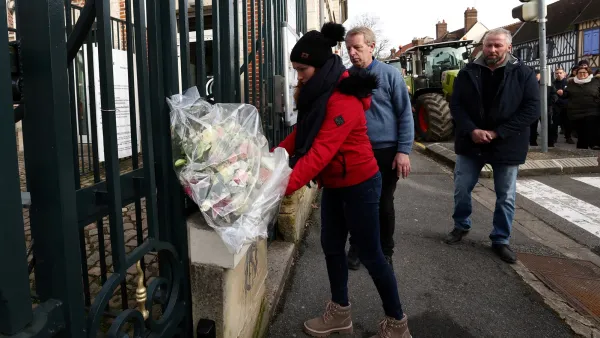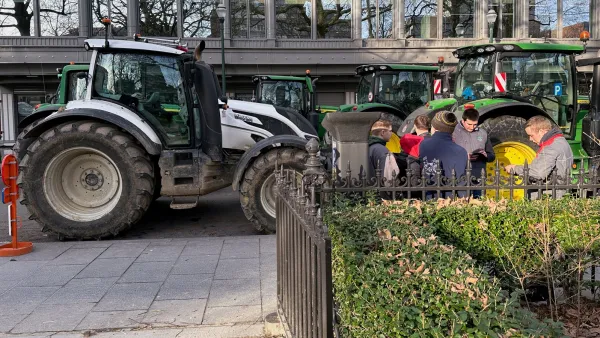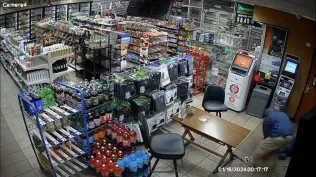From blocking highways to spraying manure on buildings: How and why farmers are protesting across Europe
All eyes remain on France where the nationwide farmers’ protests have intensified as thousands of tractors block all major highways out of Paris. However, protests by farmers have been witnessed in many European nations, including Germany, Belgium, Netherlands, Spain, Portugal, Romania and Hungary.
But first, what’s happening in France?

As farmers blocked highways outside Paris with bales of hay and straw, they also continued to dump crates of foreign-grown vegetables. Crates of tomatoes, cabbages and cauliflowers that one group of farmers said had been imported from neighbouring countries were strewn across the A7 highway that links Marseille and Lyon, France’s second and third biggest cities. Dozens of tractors led a go-slow during rush-hour on the southwestern edge of the capital.
Farmers in the southwest, who sprayed manure over a local prefecture building in Agen, directed their animal waste at a nearby Leclerc superstore, France’s biggest supermarket chain, as police looked on.
Meanwhile in France 🇫🇷
Farmers protesting in Toulouse don’t hold back with how they show their displeasure against the French government. You mess with a French farmer at your peril. pic.twitter.com/Bk3HIM0NjU
— James Melville 🚜 (@JamesMelville) January 16, 2024
The protests took a shocking turn after a woman and her teenage daughter died in southern France near Toulouse after a car hit a road block set up by farmers taking part in anti-government protests. The woman, who was killed as well as her husband, and daughter were members of the FNSEA union of agricultural workers, the union president, Arnaud Rousseau, said on RMC radio.
At Paris’ famed Louvre Museum, climate activists hurled soup at the glass protecting the “Mona Lisa” painting and shouted slogans advocating for a sustainable food system.
In a video posted on social media, two women with the words “FOOD RIPOSTE” written on their T-shirts could be seen passing under a security barrier to get closer to the painting and throwing soup at the glass protecting Leonardo da Vinci’s masterpiece. “What’s the most important thing?” they shouted. “Art, or right to a healthy and sustainable food?” “Our farming system is sick. Our farmers are dying at work,” they added.
Climate-change activists hurl soup at the ‘Mona Lisa’ at the Louvre, striking the glass that shields Leonardo da Vinci’s painting pic.twitter.com/sdNnLkfEu5
— Reuters (@Reuters) January 28, 2024
Why are the farmers protesting?
The agitation saw its beginnings last year, when farmers turned road signs upside down. By the end of 2023, French farmers started blocking roads across the country demanding government action to address numerous grievances, including not being paid enough, being choked by excessive regulation on environmental protection and red tape.
France, the European Union’s biggest agricultural producer, has witnessed farmers raising concerns like competition from cheaper imports, environmental rules that entail pesticide bans and food price negotiations. Financially, farmers argue that a push by the government and retailers to bring down food inflation has left many producers unable to cover high costs for energy, fertiliser and transport. A government plan to phase out a tax break for farmers on diesel fuel, as part of a wider energy transition policy, has also been a flashpoint.
On the environment front, farmers take issue with EU subsidy rules, such as an incoming requirement to leave 4 per cent of farmland fallow. Rows over irrigation projects, as water resources become a focus in climate debate, and criticism about animal welfare and pollution in agriculture have heightened feelings among an ageing French farmer population as being disregarded by society.
 French farmers pay tribute to Alexandra Sonac, a French farmer, and her 12-year-old daughter Camille, who were killed when a car crashed into a farmers’ roadblock south of Toulouse, amid nationwide protest over price pressures, taxes and green regulation, grievances shared by farmers across Europe, in Beauvais, France. (Reuters)
French farmers pay tribute to Alexandra Sonac, a French farmer, and her 12-year-old daughter Camille, who were killed when a car crashed into a farmers’ roadblock south of Toulouse, amid nationwide protest over price pressures, taxes and green regulation, grievances shared by farmers across Europe, in Beauvais, France. (Reuters)
France’s Interior Minister Gerald Darmanin has said that disruption and transport roadblocks caused by the farming protests are starting to impact the country’s economy. He also announced the deployment of 15,000 police officers, mostly in the Paris region, as farmers plan an agitation in the capital.
What is the government doing?
France said it would push to ease European Union environmental regulations on fallow farmland this week. The French government also dropped plans to gradually reduce state subsidies on agricultural diesel and promised a reduction in red tape and an easing of environmental regulations, but farmers’ organisations said that was not enough. Further, it would remain opposed to signing the Mercosur free-trade deal, which farmers say will flood the country with cheaper Latin American meat and produce.
Fearing a spillover from farmer unrest in Germany, Poland and Romania, the French government has already postponed a draft farming law meant to help more people become farmers, saying it will beef up the measures and ease some regulations.
Other European countries see discontent among farmers too
Similar actions follow in other European countries, including Germany and Poland, six months ahead of European elections in which the far right – for whom farmers represent a growing constituency – are seen making gains.
In Germany, protests, mostly against the phasing out of tax breaks on agricultural diesel and unfair application of environmental policies, have spiralled. Thousands of tractors entered Berlin in December last year after week-long protests, even as Finance Minister Christian Lindner said there was no money for further subsidies. The protests were prompted by a constitutional court a month ago that cancelled 60 billion euros of earmarked debt, the federal government last week announced plans to save around 900 million euros ($983.34 million) annually in subsidies for farmers.
 Belgian farmers use their tractors to block a square in central Brussels as they protest over price pressures, taxes and green regulation, grievances shared by farmers across Europe, in Brussels, Belgium. (Reuters)
Belgian farmers use their tractors to block a square in central Brussels as they protest over price pressures, taxes and green regulation, grievances shared by farmers across Europe, in Brussels, Belgium. (Reuters)
While farmers have continually protested in Brussels by spraying milk on buildings or filling streets with cattle, Hungary, Poland and Romania decried a plunge in prices owing to Ukrainian imports. In Romania, farmers have also agitated against diesel prices and insurance rates. Poland, on the other hand, saw the resignation of its agricultural minister. Sicily’s farmers said the government has failed to compensate them for the summer’s intense heat wave and drought.
Dutch farmers, meanwhile, dumped manure in the streets and protested outside politicians’ houses over regulations to cut nitrogen emissions.
Disclaimer: The copyright of this article belongs to the original author. Reposting this article is solely for the purpose of information dissemination and does not constitute any investment advice. If there is any infringement, please contact us immediately. We will make corrections or deletions as necessary. Thank you.





